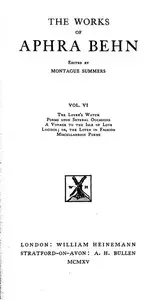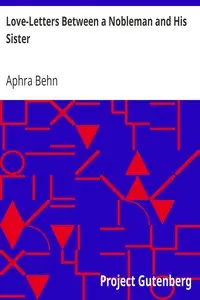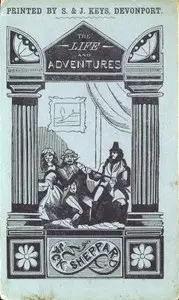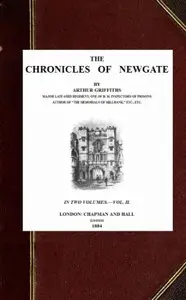"The Works of Aphra Behn, Volume I" by Aphra Behn is a compilation of dramatic plays that throws open a window into the tumultuous world of love, authority, and accepted rules in the Restoration era of 17th-century England, featuring iconic plays like "The Rover" Parts I and II, "The Dutch Lover," and "The Roundheads." These plays capture the spirit of the age with clever scenarios and characters dealing with the challenging societal norms of the time. The text emphasizes the importance of Behn's own experiences and recounts a life of speculation, including her time in Surinam and her return to England. Opening up to the world of Aphra Behn's era, the collection begins with a preface, which draws attention to the scarcity of verifiable information on Behn's existence which poses difficulties in making the collection. As the first English woman to earn a living as a writer, her collection of plays serves as a backdrop to understanding her unique perspective and influence, bringing to life the dynamic characters of the era.

The Works of Aphra Behn, Volume I
By Aphra Behn
Enter a world of witty banter and scandalous affairs, where love and power collide on the stages of 17th-century England.
Summary
About the AuthorAphra Behn was an English playwright, poet, prose writer and translator from the Restoration era. As one of the first English women to earn her living by her writing, she broke cultural barriers and served as a literary role model for later generations of women authors. Rising from obscurity, she came to the notice of Charles II, who employed her as a spy in Antwerp. Upon her return to London and a probable brief stay in debtors' prison, she began writing for the stage. She belonged to a coterie of poets and famous libertines such as John Wilmot, Lord Rochester. Behn wrote under the pastoral pseudonym Astrea. During the turbulent political times of the Exclusion Crisis, she wrote an epilogue and prologue that brought her legal trouble; she thereafter devoted most of her writing to prose genres and translations. A staunch supporter of the Stuart line, Behn declined an invitation from Bishop Burnet to write a welcoming poem to the new king William III. She died shortly after.
Aphra Behn was an English playwright, poet, prose writer and translator from the Restoration era. As one of the first English women to earn her living by her writing, she broke cultural barriers and served as a literary role model for later generations of women authors. Rising from obscurity, she came to the notice of Charles II, who employed her as a spy in Antwerp. Upon her return to London and a probable brief stay in debtors' prison, she began writing for the stage. She belonged to a coterie of poets and famous libertines such as John Wilmot, Lord Rochester. Behn wrote under the pastoral pseudonym Astrea. During the turbulent political times of the Exclusion Crisis, she wrote an epilogue and prologue that brought her legal trouble; she thereafter devoted most of her writing to prose genres and translations. A staunch supporter of the Stuart line, Behn declined an invitation from Bishop Burnet to write a welcoming poem to the new king William III. She died shortly after.




![Robert Greene: [Six Plays] by Robert Greene](https://cdn.a2-host.cloud/bMko-TiyXLo-LWg7DBsVxFll3HrtHFTzHpXNL4yFYss/rs:fill:215:325:0/g:ce/aHR0cHM6Ly9zcC1hc3NldHMuczMudXMtd2VzdC0wMDQuYmFja2JsYXplYjIuY29tL2Jvb2svNTU3NjkvUm9iZXJ0X0dyZWVuZV9TaXhfUGxheXNfY292ZXIuanBn.webp)










